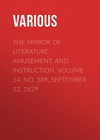Loe raamatut: «The Mirror of Literature, Amusement, and Instruction. Volume 14, No. 389, September 12, 1829», lehekülg 6
THE NATURALIST
DURATION OF LIFE
It appears from well authenticated documents, that the mean term of Roman life, among the citizens, was 30 years—that is to say, taking 1,000 persons, adding the years together they each attained, and dividing the total by the number of persons, the result is 30. In England, at the present time, the expectation of life, for persons similarly situated, is at least 50 years, giving a superiority of 20 years above the Roman citizen. The mean term of life among the easy classes at Paris is at present 42. At Florence, to the whole population, it is still not more than 30.
We have gleaned these interesting facts from a review of Dr. Hawkins's Elements of Medical Statistics; and as the subject is like human life itself, of exhaustless interest, we shall proceed with a few more:
Counties of England and Wales
In 1780, the annual mortality of England and Wales was 1 in 40. By the last census (of 1821,) the yearly mortality had fallen to 1 in 58, nearly one-third. The rate of mortality is of course not equal throughout the country. According to Dr. Hawkins, this is mainly influenced by the proportion of large towns which any district or county contains. The lowest well-ascertained rate of mortality in any part of Europe is that of Pembrokeshire and Anglesey, in Wales, where only one death takes place annually out of eighty-three individuals. Sussex enjoys the lowest rate of mortality of any English county; it is there 1 in 72. Middlesex, on the other hand, affords the other extreme, 1 in 47; yet here, where the rate of mortality is higher than in any part of England, great improvements in the mean duration of life are taking place; for in 1811, the mortality was as great as 1 in 36. Kent, Surrey, Lancashire, Warwickshire, and Cheshire, are the counties where, next to Middlesex, the deaths are most numerous. The three last named counties enjoy many natural advantages, but these are more than counterbalanced by the number and density of their manufacturing towns. It is a circumstance well worthy of note, that the aguish counties of England do not, as might have been expected, stand high in the list. In Lincolnshire, the rate of mortality is only 1 in 62. Dr. Hawkins hesitates whether to attribute this to the large proportion of dry and elevated district which that county possesses, or to the exemption of fenny countries generally from consumption. We are strongly inclined to suspect that the latter is the true explanation of the fact. The notion was originally thrown out by the late ingenious physician, Dr. Wells, who even went so far as to advise the removal of consumptive patients to the heart of the Cambridgeshire fens, rather than to Hastings or Sidmouth.
The author goes on to remark, "that the decline in the mortality is even more striking in our cities than in our rural districts. While the metropolis has extended itself in all directions, and multiplied its inhabitants to an enormous amount,—in other words, while the seeming sources of its unhealthiness have been largely augmented, it has actually become more friendly to health." In the middle of the last century, the annual mortality was about 1 in 20. By the census of 1821, it appeared as 1 in 40: so that in the space of seventy years, the chances of existence are exactly doubled in London,—a progress and final result, adds the author, without a parallel in the history of any other age or country. The high rate of mortality in London about the year 1750, exceeding considerably that of former years, has been attributed to the great, abuse of spirituous liquors, which were then sold without the very necessary check of high duties. One of the results of these statistical investigations which, a priori, we should least have been prepared for, is the uncommon healthiness of Manchester. The rate of mortality there at the present time does not appear to exceed 1 in 74.
The statistics of the sexes afford some curious results. The relative numbers of the sexes are the same in all parts of the world,—namely, at birth, twenty-one males to twenty females, but as the mortality among males during infancy exceeds that of females, the sexes at the age of fifteen are nearly equal. A late French writer, M. Giron, thinks himself warranted in the opinion, that agricultural pursuits favour an increase in the male, while commerce and manufactures encourage the female population. There exists throughout the world considerable variety in the proportion of births to marriages, but, upon an average, we may state it at about four to one. It has been uniformly found, however, that improvements in the public health are attended by a diminution of marriages and births. The great principle is this: as the number of men cannot exceed their means of subsistence, if men live longer, a less number is born, and the human race is maintained at its due complement with fewer deaths and fewer births, a contingency favourable in every respect to happiness. The author illustrates this very important principle by the population returns both of England and France.
THE GATHERER
A snapper up of unconsidered trifles.
SHAKSPEARE.
On reading in a provincial paper,3 a passage entitled, "Ornaments of the Bench and Bar."
Imitate no one you despise,
Said one whose mind was great,
Did he not think? despise not him
You cannot imitate.
TALBOTE.
SIMPLICITY
Major R– was not long since riding near a building which presented to his admiring gaze a fine specimen of antique Saxon architecture. Desirous to learn something respecting it, he made some inquiries of a man, who as it happened was the souter of the village. This learned wight informed the inquisitive stranger that the building in question was reckoned a noble specimen of Gothic architecture, and was built by the Romans, who came over with Julius Caesar. "Friend," said the Major, "you make anachronisms." "No, no, Sir," replied the man, "indeed I don't make anachronisms, for I never made any thing but shoes in my life."
The same gentleman, one day fitting on a new under-waistcoat, which he had ordered to be made of a material that should resist rain and damp, said to the tailor in attendance, "But are you sure that it is impervious." "O dear, no, Sir," replied the man, with a look of astonishment, "I certainly can't pretend to say that it is impervious, for it is wash-leather."
M.L.B.
Some men make a vanity of telling their faults; they are the strangest men in the world; they cannot dissemble; they own it is a folly; they have lost abundance of advantage by it; but if you would give them the world, they cannot help it.
ARLEQUINS
In Paris, small lumps of mixed meats sold in the market for cats, dogs, and the poor, are called Arlequins. They are the relics collected from the plates of the rich, and from the restaurateurs.
By love's delightful influence the attack of ill-humour is resisted; the violence of our passions abated; the bitter cup of affliction sweetened; all the injuries of the world alleviated; and the sweetest flowers plentifully strewed along the path of life.
At the meeting on the Covent Garden stage, the other day, a gentleman inquired for Mr. Kemble: "He's just gone off," replied another, evidently connected with the theatre. Such is the force of habit.
The late Murgravine of Anspach wrote an impromptu charade, and presented it to her husband, Lord C., as the person most interested in the subject of it, and most capable of judging of its truth:—
"Mon premier est un tyran— mari-
Mon second est un monstre— age;
Et mon tout est—le diable— mariage."
A farmer applied to a county magistrate for a warrant:—"A warrant, for what?" says the magistrate, "To take up the weather, please your worship."
P.T.W.
N.B. Warrant refused.
CONVERSATION, (from Swift.)
Nature hath left every man a capacity of being agreeable, though not of shining in company; and there are a hundred men sufficiently qualified for both, who, by a very few faults, that they might correct in half an hour, are not so much as tolerable.
LIMBIRD'S EDITION OF THE
Following Novels is already Published:





















